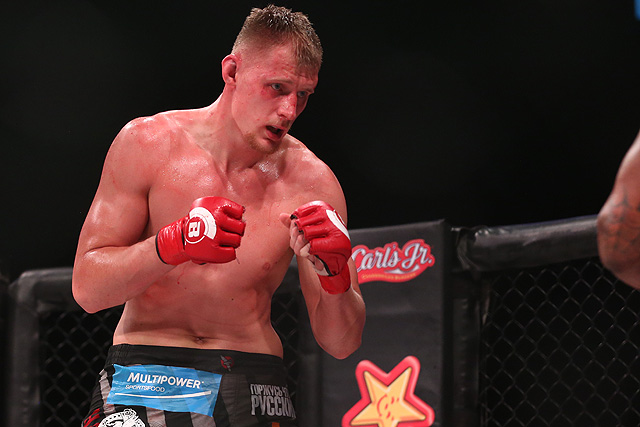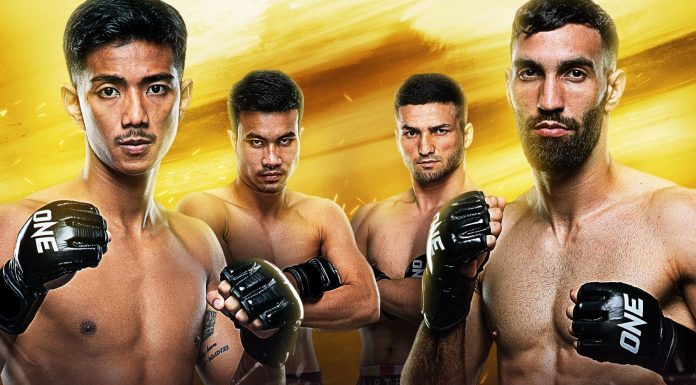
Now that the distraction that was “The Money Fight” has passed, as surprisingly entertaining as it was (at least if you went in with low expectations), we can all get back to the sport of MMA, right? This weekend, the UFC lands in Rotterdam, Netherlands. Headlined by a heavyweight showdown between Stefan Struve and Alexander Volkov, it’s one of those cards that could turn out to be a fun night, or afternoon, for those of us in North America, but on paper looks a little thin. In fact, lets be honest — the card is downright puzzling, and continues a recent trend of absolutely baffling foreign cards.
Lets break down UFC Rotterdam, or UFC Fight Night 115, if you like keeping count, first. The heavyweight bout between Struve and Volkov is a no-brainer, but as a headliner, well, it’s less than A-list. Struve is, to be fair, on his first win streak since 2012, but has struggled to stay consistent, and with thirty-six pro fights at age twenty-nine, is fairly long in the tooth as fight years go. His ace in the hole may be a TKO win over current heavyweight champ Stipe Miocic back in 2012, which happened to be the last time the “Skyscraper” headlined a card. Does that punch your ticket to a main event? Maybe, against a solid name.
Alexander Volkov however? Lets be honest, Volkov was the best former Bellator heavyweight champion outside the UFC not named Vitaly Minakov — who appears to be stuck in contract dispute limbo. Cole Konrad, we hardly knew ye.
In short, the UFC picked up a decent heavyweight in Volkov, but really, his seventh place ranking in the promotion’s official standings serves only to show how shallow the division really is at the moment. That a couple of close decisions to Tim Johnson and Roy Nelson have landed Volkov in a main event, and that high up the division ladder, is borderline absurd.
Giving Struve the nod, of course, is pandering to local fans, but it seems as if the UFC let a bigger name slip through their fingers not too long ago in Gegard Mousasi. “The Dreamcatcher” was on a five fight UFC win streak with victories over two former champions when the promotion let Bellator scoop him up. Now, consider that Mousasi, a Dutchman of Armenian ancestry, could easily have both sold out this event and drawn more eyeballs to the broadcast, and you have a rather curious situation. In the long run, Mousasi was closer to a title shot, better known, and more marketable than Struve.
Yet the UFC let him walk no doubt knowing they had an upcoming show in Rotterdam, plus other cards that would have been boosted by the presence of a fighter of Mousasi’s caliber.
Okay, fine, that’s a business decision you say. Yet the co-main event of UFC Rotterdam was set to feature Germaine de Randamie against Marion Reneau, better known as the UFC’s least popular female fighter against its oldest. de Randamie, in fact, having been stripped of her featherweight title for refusing to battle Cris Cyborg, is about as popular as a vegan at a steakhouse at the moment. She garnered some sympathy for pointing out Cyborg’s past issues with drug test failures, but ultimately, once a fighter has done their time, fighting them becomes a requirement if they happen to be the number one contender.
Germaine de Randamie refused, and found herself stripped of UFC gold without ever having defended her title (and that’s after winning it in controversial fashion).
Booking the Dutch former champ for the Rotterdam card wasn’t a terrible idea, since the UFC would have to use her eventually, but as a co-main event, the less-than-popular fighter was a curious choice. There’s the issue with propping up cards with local talent: if you appease only regional fans, you risk alienating the international audience.
de Randamie became a non-factor in the end anyhow, dropping off the card due to injury. Renau now gets promotional newcomer Talita Oliveira, while Siyar Bahadurzada finds himself in the co-main event despite having fought just once since 2013.
Ouch. Now imagine if the UFC had hung on to Mousasi, set Struve vs. Volkov as the co-main event, and booked an international star or two further down the card. When you compare UFC Fight Night 120 in Norfolk this year, the quality is night and day, frankly.
UFC Norfolk features exciting match-ups between former champ Anthony Pettis and Dustin Poirier, TUF 23 winner Tatiana Suarez vs. Vivianne Pereira, Matt Brown vs. Diego Sanchez, former Invicta champ Angela Hill vs. Nina Ansaroff, former heavyweight champ Andrei Arlovski vs. Junior Albini — in short, a card that, if it holds together, should really spark fan interest.
With a nearly a month off thanks to Mayweather-McGregor, the UFC surely could have given UFC Rotterdam a boost. Yet Rotterdam is not alone. So far, UFC Gdansk seems to take a similar, less star power, more local talent approach. Bizarrely, current speculation is that Polish fighter Michał Materla will face Thiago Santos in the main event. While it’s not confirmed, if it turns out to be true, Santos, a solid middleweight who is 2-2 in his last four, will meet a promotional newcomer to top a card. Materla (24-5) has been a force in Polish MMA, with a number of high profile wins under the KSW banner, but to UFC fans, he’s a virtual unknown.
UFC Gdansk does have the chance to be a better card than Rotterdam, mind you. If only marginally. Fighters like Andre Fili, Artem Lobov, Marcin Held, and Jan Blacowicz are already on board, and the card still has a number of slots to fill. Yet if you had to give a verdict today, Rotterdam and Gdansk would be two peas in a pod as poorly booked European stops for the UFC. And UFC Mexico City last month wasn’t exactly a stacked card on paper either.
The problem with relying on local talent to fill foreign UFC cards is simple: one, it lowers interest for fans outside the region. Hardcore fans will watch everything, of course, but the casual fanbase required to turn an okay event into a huge success, ratings wise? They’re not interested. Second, as much as the local fanbase loves to cheer on hometown fighters, pandering to them too much does them a disservice by robbing them of the opportunity to watch the best fighters live. When the UFC brought Jon Jones vs. Alexander Gustafsson to Toronto at UFC 165, no one was complaining about the lack of Canadian content in the main event. Of course not every card is getting a title fight (though it’s surprising that the UFC has yet to take Joanna Champion to her native Poland), but there are plenty of highly talented fighters who could top cards.
At some point, the UFC is going to have to accept that you can’t always have Mark Hunt headline Australia and New Zealand, or a Brazilian in Brazil (though with the large number of Brazilian fighters that’s less of an issue). That pandering to local fans is assuming that they’re not invested enough in the sport to know that they’re being cheated out of the opportunity to watch some great athletes live.
In the meantime, fans in Poland may want to book a ticket to Norfolk. With Marlon Moraes vs. John Dodson now added to the mix, that card is just plain stacked.




















